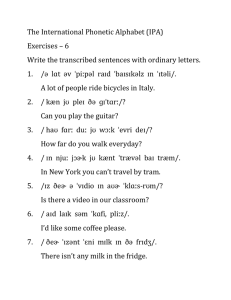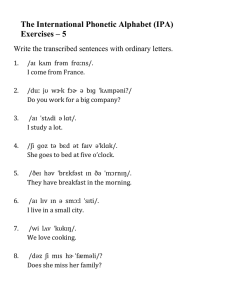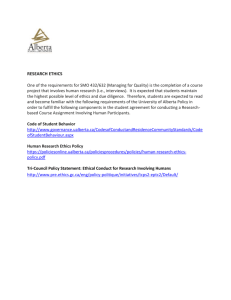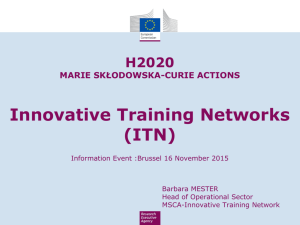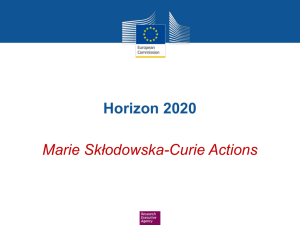H2020-MSCA-ITN-2016 Part B – Document 2 – Annotated
advertisement
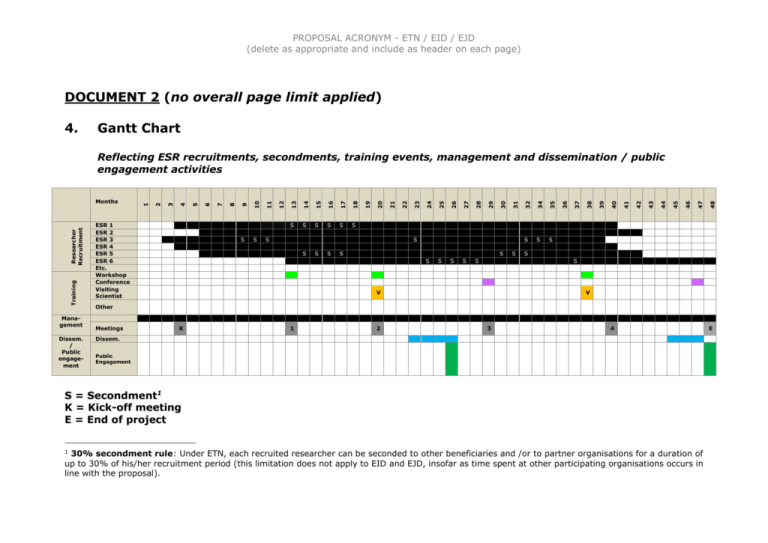
PROPOSAL ACRONYM - ETN / EID / EJD (delete as appropriate and include as header on each page) DOCUMENT 2 (no overall page limit applied) 4. Gantt Chart Training Management Dissem. / Public engagement S S S S S S S S S S S S S V V Other Meetings K 1 2 3 4 Dissem. Public Engagement S = Secondment1 K = Kick-off meeting E = End of project 30% secondment rule: Under ETN, each recruited researcher can be seconded to other beneficiaries and /or to partner organisations for a duration of up to 30% of his/her recruitment period (this limitation does not apply to EID and EJD, insofar as time spent at other participating organisations occurs in line with the proposal). 1 48 47 46 45 44 43 42 41 40 39 S 38 S 37 S 36 35 31 30 29 28 27 26 25 S 34 S 24 S 23 18 S 22 17 S 21 16 S 20 15 S 19 14 12 S 32 S 11 9 S 10 8 7 6 5 4 3 2 ESR 1 ESR 2 ESR 3 ESR 4 ESR 5 ESR 6 Etc. Workshop Conference Visiting Scientist 13 Researcher Recruitment Months 1 Reflecting ESR recruitments, secondments, training events, management and dissemination / public engagement activities E PROPOSAL ACRONYM - ETN / EID / EJD (delete as appropriate and include as header on each page) 5. Participating Organisations All organisations (whether beneficiaries or partner organisations) must complete the appropriate table below. Complete one table of maximum one page per beneficiary and half a page per partner organisation (minimum font size: 9). For beneficiaries: Beneficiary Legal Name: General Description Role and Commitment of key persons (including supervisors) Key Research Facilities, Infrastructure and Equipment Independent Research premises Previous Involvement in Research and Training Programmes Current Involvement in Research and Training Programmes Relevant Publications and/or Research / Innovation Product Include HR Excellence in Research logo here if applicable Including names, title and the intended extent of involvement in percentage of full-time employment - of the key scientific staff who will be involved in the research, training and supervision Demonstrate that each team has sufficient facilities and infrastructure to host and/or offer a suitable environment for supervising the research and training of the recruited Early-Stage Researchers Please explain the status of the beneficiary's research facilities – i.e. are they owned by the beneficiary or rented by it? Are its research premises wholly independent from other beneficiaries and/or partner organisations in the consortium? Detail any relevant EU, national or international research and training projects in which the partner has previously participated Detail any relevant EU, national or international research and training projects in which the partner is currently participating Max. 5 For partner organisations: Partner Organisation Legal Name: General description Key Persons and Expertise Key Research Facilities, Infrastructure and Equipment Previous and Current Involvement in Research and Training Programmes Relevant Publications and/or Research / Innovation Product Detail any relevant EU, national or international research and training projects in which the partner is currently participating Max. 3 Do not leave this blank. It could be publications, patents, policy interventions, trade secrets, new products (including software) or processes,….. PROPOSAL ACRONYM - ETN / EID / EJD (delete as appropriate and include as header on each page) 6. Ethics Issues All research activities in Horizon 2020 must respect fundamental ethics principles, including those reflected in the Charter of Fundamental Rights of the European Union.2 These principles include the need to ensure the freedom of research and the need to protect the physical and moral integrity of individuals and the welfare of animals. Research ethics is of crucial importance for all scientific domains. Informed consent and confidentiality are as important for a sociological study as they are for clinical research. All proposals considered for funding will be submitted to an Ethics Review. The Ethics Review is the core of the H2020 Ethics Appraisal scheme, which concerns all proposals and projects, and also includes the Ethics Checks and Ethics Audit that can be initiated during the project implementation. In this context, please be aware that it is the applicants’ responsibility to identify any potential ethical issues, to handle the ethical aspects of their proposal, and to detail how they plan to address them. If any ethics issues have been entered in the ethical issues checklist in Part A of the proposal, then an ethics self-assessment must be included in this section. For more details, please refer to the “H2020 How to complete your Ethics SelfAssessment” guide. The self-assessment in this section must: 1) Describe how the proposal meets the national legal and ethics requirements of the country or countries where the tasks raising ethical issues are to be carried out. Should the proposal be selected for funding, applicants will be required to provide the following documents, if they are already in their possession: The ethics committee opinion required under national law The document that is mandatory under national law notifying activities raising ethics issues or authorising such activities If these documents are not in English, applicants must also submit an English summary of them (containing, if available, the conclusions of the committee or authority concerned). If it is planned to request these documents specifically for the proposed project, the request must contain an explicit reference to its title. Charter of Fundamental Rights of the European Union, 2000/C 364/01. See also: http://www.europarl.europa.eu/charter/default_en.htm 2 PROPOSAL ACRONYM - ETN / EID / EJD (delete as appropriate and include as header on each page) 2) Explain in detail in the ethics issues table how the consortium intends to address the issues, in particular as regards: 7. Research objectives (e.g. study of vulnerable populations, dual use, etc.) Research methodology (e.g. clinical trials, involvement of children and related consent procedures, protection of any data collected, etc.) The potential impact of the research (e.g. dual use issues, environmental damage, stigmatisation of particular social groups, political or financial retaliation, benefit-sharing, malevolent use, etc.). Letters of Commitment Please use this section to insert scanned copies of the required Letters of Commitment from partner organisations. For EJD, Letters of Institutional Commitment must also be included from those academic beneficiaries that will award the doctoral degrees. These letters should be signed by an authorised legal representative of the organisation in question. There is no specific template for these letters. PROPOSAL ACRONYM - ETN / EID / EJD (delete as appropriate and include as header on each page) END PAGE MARIE SKŁODOWSKA-CURIE ACTIONS Innovative Training Networks (ITN) Call: H2020-MSCA-ITN-2016 PART B “PROPOSAL ACRONYM” This proposal is to be evaluated as: [ETN] [EID] [EJD] [delete as appropriate] Part B - Page X of Y
